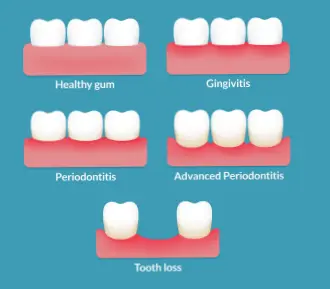Stages of Gum Diseases
Gum diseases are a very common in adults and studies have shown 95% of Indians suffer from some stage of gum disease. If you forget to brush or floss regularly, a sticky film of bacteria and food called plaque buildup around the teeth within 4-12 hours and this film can harden to form tartar within 48 hours. Tartar is hard to clean and over time builds up which irritates and inflames your gums.

- Gingivitis: Gingivitis is the mildest form of gum disease and occurs when plaque, a sticky film of bacteria, builds up on teeth and along the gumline. The bacteria in plaque cause inflammation of the gums. However, at this stage, the supporting structures of the teeth have not been affected, and the condition is still reversible with proper treatment and oral hygiene practices.
- Periodontitis: If gingivitis goes untreated, it can progress to periodontitis. At this stage, the infection spreads below the gumline, causing the gums to pull away from the teeth, creating pockets. These pockets become sites for further bacterial growth and contribute to the destruction of surrounding soft tissues, including the bone which holds the teeth firmly. Symptoms may worsen, including increased gum inflammation, persistent bad breath, receding gums, tooth sensitivity, and loose teeth. Periodontitis can be classified as mild, moderate, or severe, depending on the extent of bone and tissue loss.
- Advanced periodontitis: When periodontitis remains untreated and progresses further, it enters the advanced stage. This is the most severe form of gum disease, characterized by significant destruction of the gum tissues, bone loss, and potential tooth loss. Symptoms can include severe gum recession, movement or loosening of teeth, changes in bite alignment, pus around the teeth, severe bad breath, and pain while chewing.
It is important to note that early detection, professional dental care, and proper oral hygiene practices are crucial to preventing gum disease or catching it in its early stages. Regular dental check-ups and cleanings help identify any issues and allow for timely intervention to preserve your oral health.

